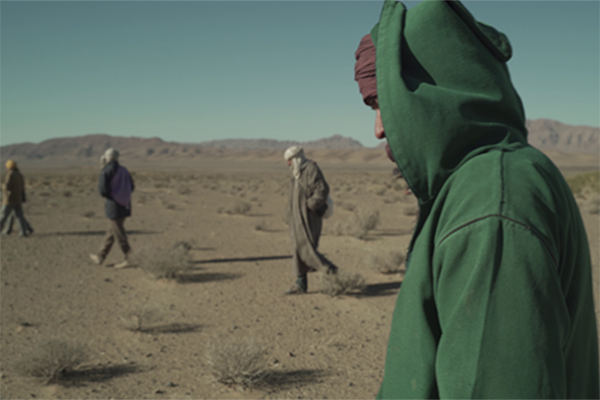With 22 projects from the MENA region, two from the GCC, and seven from Qatar, the programme amplifies emerging creative voices in the development of original and compelling content.
The Doha Film Institute (DFI) has announced an impressive slate of 39 projects by first-and-second-time filmmakers from around the world and established names from the Arab world to receive its Fall 2020 Grants – the Institute’s leading film funding programme that supports emerging voices in film.
With 22 projects from the MENA region, two from the GCC, and seven from Qatar, the programme continues in its mission to amplify emerging creative voices in the development of original and compelling content. Recognising the central role of women in cinema, 16 of the chosen projects are by talented female directors.
Acting as a key platform to first- and second time filmmakers from around the world, the DFI Grants programme has evolved to be a crucial initiative that identifies new cinematic talent and discovers universally resonant stories. The programme facilitates creative development and interaction and supports powerful and moving storytelling across a broad spectrum of issues and perspectives to help emerging filmmakers realise their creative aspirations.
The Fall 2020 Grants covers a wide range of film productions that include feature, documentary, short film, TV series and a VR project. Among the 39 selected projects are TV series by Qatari and GCC talent and affirming its role as a champion of Arab cinema, 31 selected projects represent powerful emerging voices from the MENA region. The eight selected international projects in post-production stage represent Belgium, Bolivia, China, Ethiopia, France, Iran, Philippines and Sweden.
Fatma Hassan Alremaihi, Chief Executive Officer of the Doha Film Institute, said: “We have worked over the past ten years on our commitment to establish an important resource hub as part of a comprehensive ecosystem that promotes Arab talent and skills and adds value to the region’s creative industry. The DFI Grants programme demonstrates our core mission to amplify important cinematic voices to realise their storytelling aspirations, and to develop and support world cinema to promote cultural diversity in the film industry.
“We are extremely proud of our past and future grant recipients, who represent DFI’s role in the development of independent cinema, and hope to further expand the creation of original and compelling content from the Arab world and beyond. The programme’s growing acclaim is a testament to its contribution in realising ambitious creative vision.”
First- and second-time directors from the MENA region are eligible for DFI’s development, production and post-production funding for feature-length projects. Production funding is available to short films from the MENA region; development funding for screenwriters from the MENA region for TV series; and production funding to directors from the MENA region for web series. Established MENA directors can apply for post-production funding for feature-length projects. Post-production funding is also available to international first- and second-time filmmakers for feature-length projects.
The 2021 Springs Grants cycle is open for submissions from January 4-17, 2021.
A full list of the Fall 2020 Grant recipients is below.
MENA – Feature Narrative – Development:
- Queens of Shadow(Morocco, Qatar) by Aida Senna follows Houria, a young law student, whose disappointment in the justice system leads her to take revenge.
• The Crown of Olives (Oman, Italy, Qatar) by Muzna Almusafer is about a girl who suffers from a past that is constantly chasing her and tries to save her friend from a similar fate.
MENA – Feature Documentary – Development:
- Out of Place(Palestine, Sweden, Qatar) by Mohammed Al-Madjalawi is a coming-of-age story filmed throughout 20 years following Palestinians, who have now successfully settled in Europe.
• In Targuia (France, Algeria, Italy, Qatar) by Leïla Artese Benhadj, 16-year-old Tab must choose between getting married and settling in town – or staying in the desert where she looks after her ten siblings.
• The Camera Never Cries (Sudan, Qatar) by Elsadig Abdelgayoum and Abuzar Adam is about two filmmakers who encounter death to document the 2019 Sudanese revolution only to be confronted with their personal intentions and political drives following the COVID-19 lockdown.
• Theft of Fire (Palestine, Canada, Qatar) by Amer Shomali is a fantasy thriller in which a Palestinian artist decides to steal back confiscated Palestinian art.
• Wall of Death (Morocco, France, Qatar) by Amine Sabir follows Zahra, who is torn between her family’s expectations and the desire to choose her own path and go against her parents’ wishes by performing in the motorcycle acrobatics show “Wall of Death”.
MENA – TV Series – Development:
- Adapted from the bestselling novel by Susan Abulhawa, Mornings in Jenin(Palestine, UK, Qatar) by Annemarie Jacir is a multi-generational story that spans five countries, four generations and the intertwining lives of three siblings.
• In the late 1980s period drama inspired by actual events The Exchange(Kuwait, Qatar) by Nadia Ahmad, two trailblazing women disrupt the corrupt boys club of Kuwait’s banking industry as the Gulf War looms.
MENA – Feature Narrative – Production:
- In Ashkal(Tunisia, France, Qatar) by Youssef Chebbi, Batal and Fatma are carrying out an investigation on a strange case of immolations.
• Blacklight (Algeria, France, Qatar) by Karim Bensalah is the story of Sofiane, an Algerian student living in France, who tries to avoid deportation by working in a funeral home.
• In Under Construction (Lebanon, Qatar) by Nadim Tabet, a Syrian worker uncovers mysterious disappearances from a construction site near a Lebanese village.
MENA – Feature Documentary – Production:
- Companions of the White Arc(Qatar, Jordan, Norway, Romania) by Elia Youssef and Mohammed Al Thani follows the first Qatari to achieve mountaineering’s coveted “Grand Slam” title during his arduous North Pole expedition.
• It Snows at Sidi Bou Said (Tunisia, France, Qatar) by Fatma Chérif is a filmed diary in which the filmmaker embarks on a search of the images that defined her life choices.
• In Jodari Meno (Qatar, Zanzibar, Italy) by Jamal Al-Khanji, a Qatari spearfisherman chases his dream of catching a once in a lifetime fish.
• My Father’s House (Denmark, Palestine, Qatar) by Mahdi Fleifel is personal story about memory, exile, a father and son, and a family bond through generations.
MENA – Web Series – Production:
- Locals. Qatar.(Qatar) by Saud Al-Thani is a hyper-inclusive look into what responsibility and sense of belonging mean in a place where 90 percent of the population are guests.
• Rise of the Mad Cat (Qatar) by Meshaal AlAbdulla captures the adventures of a stray cat named Chimbir and Casper the goldfish, as they team up to take on the world and establish their scientific tech empire.
Feature Narrative – Post-Production:
MENA-Established
- Neighbours(Syria, Switzerland, Qatar) by Mano Khalil tells of a childhood stuck between dictatorship and dark drama, as a six-year-old Kurdish boy experiences his first year in an Arab school.
NON-MENA
- In El Gran Movimiento(Bolivia, France, Switzerland, Qatar) by Kiro Russo, a worker falls ill upon his arrival to the city of La Paz, and his godmother attempts to save him through a healer.
• Orca (Iran, Qatar) by Sahar Mossayebi follows a divorced Iranian woman in search of her goal—the Guinness World record for swimming the longest distance with her hands bound.
• Set in 2013 Tacloban, Whether the Weather is Fine (Philippines, France, Singapore, Indonesia, Germany, Qatar) by Carlo Francisco Manatad follows Miguel after he wakes up in the chaos of Typhoon Haiyan.
Feature Documentary – Post-Production:
MENA
- As I Want(Palestine, Norway, France) by Samaher Alqadi depicts an Arab woman’s personal process of self-emancipation in a revolutionary struggle against the odds.
- Fragments from Heaven(Morocco, France, Qatar) by Adnane Baraka is the story of Mohamed, scientist Abderrahmane, and other Bedouins, who search for celestial stones in the deserts of Morocco, but for varying motives.
NON-MENA
- Children of the Enemy(Sweden, Denmark, Qatar) by Gorki Glaser-Müller is the story of bohemian musician Patricio, who lost his daughter to the Islamic State and seeks to save his grandchildren.
• Faya Dayi (Ethiopia, USA, Qatar) by Jessica Beshir is a spiritual journey immersed in the rituals of “khat”, a fantasy inducing leaf that has become the most lucrative cash crop in Ethiopia. The film is part of the World Cinema Documentary Competition at Sundance Film Festival 2021.
• Set in a close-Arab community, in a village situated near Syrian border of Turkey, Les Enfants Terribles (France, Germany, Turkey, Qatar) by Ahmet Necdet Cupur unfolds a familial story, where children must face their imposed fate and pressure from the community, to emancipate and follow aspirations.
• In Miles to Go Before She Sleeps (China, USA, Qatar) by Mijie Li, a Chinese animal activist is on a mission to stop the slaughtering of dogs in provinces where dog consumption is glorified as a gourmet tradition.
• The Miracle of Almería (Belgium, Switzerland, Netherlands, Qatar) by Moon Blaisse follows the legal and illegalised inhabitants of Almeria, the biggest vegetable garden in Europe.
MENA – Short Narrative – Production:
- A Simple Cut(Qatar) by Maha Al-Jefairi is about a young girl that goes to ridiculous lengths to hide her haircut from her overbearing mother.
• In Dear Son (Lebanon, Qatar) by Wassim Geagea, a nun finds herself facing difficult decisions between the vows imposed by the monastic life and her maternal feeling.
• On the Dock (Morocco, France, Qatar) by Yassine Ouahrani follows a retired immigrant, who tries to find new ways to justify his stay in France when a new law is introduced.
• Kendila (Tunisia, Qatar) by Nadia Rais depicts a neo-apocalyptic world told through the landscape of the polluted village of Makhboul, whose bay has become infested by a swarm of jellyfish.
• The Bird’s Placebo (Tunisia, Germany, Qatar) by Rami Jarboui is about a young Tunisian man from a poor neighbourhood, who is reincarnated into a bird after his legs are amputated while trying to cross the Mediterranean.
MENA – Short Documentary – Production:
- Abandon(Lebanon, Qatar) by Farah Shaer is a VR 360° short about a middle-aged couple’s last day in Lebanon before their planned emigration amid the country’s socio-economic meltdown.
• Aziza (Morocco, Qatar) by Chahine Fellahi unfolds untold stories of women’s participation in the resistance movements against colonial occupation in Morocco.
• Don’t Get Too Comfortable (Yemen, UAE, Kenya, Qatar) by Shaima Al Tamimi is a video letter to the director’s paternal grandfather, whom she never met, narrating the story of her family’s journey as Yemenis who will continue to be immigrants for the next decades.
Qatar – Short Narrative – Post-Production:
- Hope(Qatar) by Abdulla Al-Janahi is the journey of a disabled, but very determined little sea turtle named Aqua as he overcomes every obstacle from nest to sea.
• Revenge Knows Nothing (Qatar) by Abdulla Al-Janahi and Abdulaziz Khashabi showcases the horrific effects of human injustice and selfish actions on its victims – human or otherwise.















































































